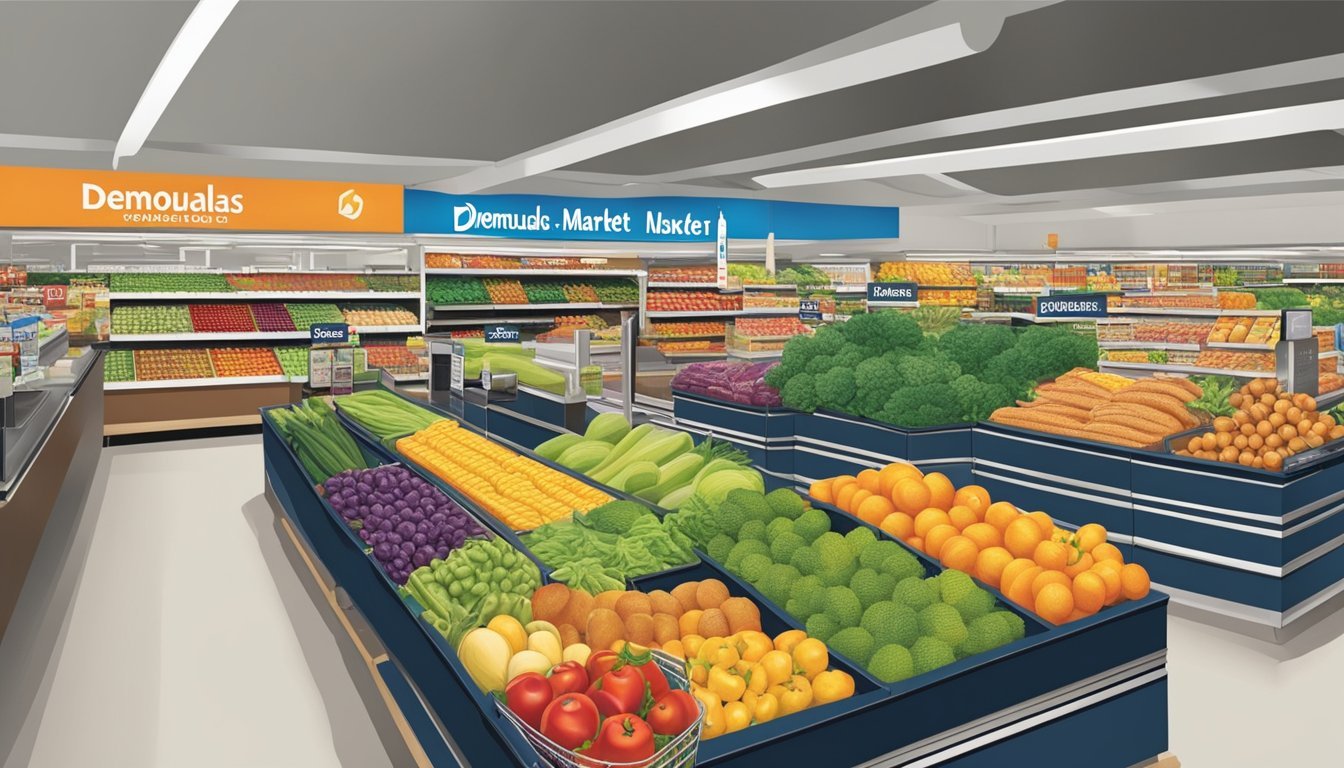Demoulas Market Basket vs Walmart
A Comprehensive Comparison of Price, Quality, and Selection
Demoulas Market Basket and Walmart are two grocery giants known for their competitive pricing strategies. While Walmart boasts a nationwide presence, Market Basket has carved out a loyal following in New England with its unique approach to customer service and affordability.
Market Basket's prices are approximately 18% lower than the average grocery store, nearly matching Walmart's 19% discount. This translates to significant savings for consumers, with a family spending $250 weekly on groceries potentially saving over $2,300 annually by choosing Market Basket over typical competitors.
Beyond price, Market Basket distinguishes itself through its commitment to quality products and employee satisfaction. The chain's ability to maintain low prices while prioritizing these factors has earned it a devoted customer base and recognition in industry studies comparing grocery chains' performance during inflationary periods.
History and Background
Market Basket and Walmart have distinct histories that shaped their development into major grocery retailers. Both companies grew from humble beginnings to become influential players in the supermarket industry.
The Legacy of Market Basket
Market Basket's roots trace back to 1917 when Greek immigrants Athanassios and Efrosini Demoulas opened a small grocery store in Lowell, Massachusetts. Their son George expanded the business in the 1950s, transforming it into a supermarket chain.
Market Basket grew steadily across New England, establishing a strong presence in Massachusetts, New Hampshire, Maine, and Rhode Island. The company became known for its low prices and employee-friendly practices.
In 2014, Market Basket faced a major crisis when Arthur T. Demoulas was ousted as CEO, leading to widespread employee protests and customer boycotts. The dispute was resolved when Arthur T. and his allies purchased the company, preserving its business model and culture.
Walmart's Rise to Prominence
Sam Walton founded Walmart in 1962, opening the first store in Rogers, Arkansas. The company focused on providing low prices in small town markets often overlooked by larger retailers.
Walmart expanded rapidly throughout the 1970s and 1980s, becoming the largest retailer in the United States by 1990. The company introduced its Supercenter format in 1988, combining general merchandise with a full grocery section.
By the early 2000s, Walmart had become the world's largest grocery retailer. The company's massive scale and efficient supply chain allowed it to offer consistently low prices, reshaping the supermarket industry.
Walmart continued to grow globally, but faced criticisms over its labor practices and impact on local businesses. The company has since made efforts to improve its image and adapt to changing consumer preferences.
Business Models and Strategies
Market Basket and Walmart employ distinct approaches to grocery retail, each with unique strategies for pricing, operations, and customer service. These differences shape their business models and market positioning.
Market Basket's Approach to Groceries
Market Basket focuses on a high-volume, low-price strategy. The company maintains lower prices than competitors while offering quality products. This approach attracts budget-conscious consumers and drives sales volume.
Market Basket emphasizes customer service and employee satisfaction. The company offers generous pay and benefits to workers, fostering loyalty and reducing turnover. This strategy contributes to efficient operations and positive customer experiences.
Arthur T. Demoulas, Market Basket's CEO, prioritizes a profit-sharing plan for employees. This approach aligns worker interests with company success, enhancing productivity and customer service.
Market Basket's business model centers on operational efficiency and cost savings. The company keeps operating costs low, allowing for competitive pricing without sacrificing product quality or employee benefits.
Walmart's Operational Tactics
Walmart leverages its massive scale to negotiate low prices from suppliers. This enables the company to offer competitive pricing to consumers while maintaining profitability.
The retail giant invests heavily in technology to streamline operations. Advanced inventory management systems and data analytics help Walmart optimize stock levels and reduce waste.
Walmart's strategy includes a wide product selection beyond groceries. This diverse offering attracts customers seeking one-stop shopping experiences, potentially increasing overall sales.
The company focuses on cost-cutting measures to maintain low prices. This includes efficient supply chain management and lean staffing models. However, this approach may impact customer service quality compared to Market Basket's more service-oriented model.
Walmart's global presence allows it to weather regional economic fluctuations more effectively than smaller chains. This scale provides stability and resources to adapt to changing market conditions.
Product Range and Quality
Market Basket and Walmart offer distinct product selections and quality standards. Both stores aim to meet diverse customer needs but take different approaches to their inventory and sourcing.
Market Basket's Commitment to Quality
Market Basket prioritizes high-quality products at competitive prices. The chain focuses on fresh produce, meats, and local items. Their produce section features a variety of fruits and vegetables, often sourced from regional farms.
Market Basket's meat department is known for its quality cuts and trained butchers. The store's bakery produces fresh bread and pastries daily. Their dairy section includes both national brands and local options.
Market Basket's commitment to quality extends to their private label products, which undergo rigorous testing. The store's seafood department offers a selection of fresh and frozen options, with an emphasis on sustainability.
Walmart's Diverse Inventory
Walmart boasts a vast and diverse product range. The supermarket giant carries an extensive selection of groceries, including national brands and their own Great Value line.
Walmart's produce section offers a wide variety of fruits and vegetables at affordable prices. Their meat department includes pre-packaged options and some stores feature in-house butchers.
The store's bakery provides both fresh and packaged baked goods. Walmart's deli offers prepared foods and custom orders. Their expansive dairy section includes a range of milk, cheese, and yogurt options.
Walmart's size allows them to stock a broader range of specialty and international products compared to smaller chains.
Pricing and Savings
Market Basket and Walmart both employ distinct pricing strategies to attract budget-conscious shoppers. These approaches impact customer savings and store loyalty in different ways.
Market Basket's Pricing Strategy
Market Basket offers significantly lower prices compared to industry averages. Their prices are approximately 18% below the all-store average, translating to substantial savings for customers. A family spending $250 weekly on groceries could save over $2,300 annually by shopping at Market Basket.
The chain maintains competitive pricing without sacrificing quality. Market Basket scored well for "overall quality" in consumer studies, despite not receiving top marks for specific departments like produce or meat.
Market Basket's pricing strategy fosters strong customer loyalty. The company keeps costs low through efficient operations and a focus on essentials rather than frills.
Walmart and Everyday Low Pricing
Walmart's "Everyday Low Price" strategy aims to consistently offer reduced prices across its product range. Their grocery prices average 19% below the all-store average, slightly edging out Market Basket in savings potential.
With 3,572 Supercenters nationwide, Walmart leverages its massive scale to negotiate favorable terms with suppliers. This buying power allows them to maintain competitive pricing on groceries and other goods.
Walmart's broad product selection extends beyond groceries, offering customers one-stop shopping convenience. However, this expansive inventory can sometimes lead to higher operating costs compared to more specialized grocery chains.
Walmart accepts various payment methods, including credit cards, enhancing accessibility for diverse customer budgets.
Customer Experience and Services
Market Basket and Walmart offer distinct shopping experiences tailored to different customer needs. Each store has unique approaches to service, layout, and customer interaction.
Shopping at Market Basket
Market Basket creates a family-like atmosphere in its stores. Employees often greet regular customers by name, fostering a sense of community. The chain prioritizes customer service, with staff readily available to assist shoppers.
Market Basket stores typically have wider aisles and a more open layout. This design makes navigation easier for customers pushing carts or shopping with children.
The checkout process at Market Basket is efficient. While self-checkout options are limited, the store compensates with well-staffed registers to minimize wait times.
The Walmart Shopper's Journey
Walmart offers a one-stop shopping experience. Customers can find groceries alongside electronics, clothing, and household items.
The store layout is designed for efficiency, with clear signage guiding shoppers to different departments. Walmart's size can sometimes make finding specific items challenging.
Self-checkout kiosks are prevalent in Walmart stores, catering to customers who prefer a quick, autonomous shopping experience. However, this can lead to reduced personal interaction.
Walmart's customer service approach is more standardized. While staff are generally helpful, the personal touch found in smaller chains may be less evident.
Corporate Responsibility and Community Impact
Market Basket and Walmart have distinct approaches to corporate responsibility and community engagement. Their strategies reflect different priorities and values, shaping their relationships with employees, customers, and local communities.
Market Basket's Community Engagement
Market Basket's business model centers on community empowerment. The company prioritizes low prices and excellent customer service, fostering strong local connections. In 2014, Market Basket faced a crisis when CEO Arthur T. Demoulas was ousted by the board of directors. Employees and customers rallied together, organizing protests and boycotts to reinstate him. This unprecedented show of support highlighted the deep bond between Market Basket and its community.
The company is known for treating employees well, offering competitive wages and benefits. Market Basket's focus on affordability helps local families stretch their budgets. Its commitment to the communities it serves has built a loyal customer base and a reputation for social responsibility.
Walmart's Role in Society
Walmart, as a global retail giant, has a significant impact on communities worldwide. The company has implemented sustainability initiatives, aiming to reduce its environmental footprint. Walmart's low-price strategy benefits consumers but has faced criticism for potentially affecting local businesses.
The retailer has made efforts to improve employee benefits and wages in recent years. Walmart's scale allows it to provide disaster relief and support various community programs. However, the company has faced scrutiny over labor practices and its effect on small businesses.
Walmart's sustainability goals include reducing emissions and promoting renewable energy. The company's size gives it considerable influence in shaping industry standards and practices. Its community impact varies across different locations, with both positive and negative effects on local economies.
Comparative Analysis
Market Basket and Walmart represent two distinct approaches to grocery retail, each with unique strengths and strategies. Their differences span pricing, product quality, customer experience, and overall value proposition.
Market Basket vs. Walmart: The Verdict
Market Basket excels in offering exceptionally low prices while maintaining high product quality. A consumer data study by Dunnhuby ranked Market Basket highly for affordability among over 60 grocery chains. The company's pricing strategy allows customers to save significantly - up to $2,300 annually for a family spending $250 weekly on groceries.
Walmart, a retail giant, leverages its massive scale to keep prices competitive. However, Market Basket often matches or beats Walmart's pricing, particularly in grocery items. This feat is remarkable given Walmart's size advantage.
Product quality is another area where Market Basket shines. The chain is known for fresh produce and high-quality store-brand items. Walmart offers a wider product range but may not consistently match Market Basket's quality standards in groceries.
Customer experience differs markedly between the two. Market Basket fosters a loyal customer base through its family-owned atmosphere and community involvement. Walmart provides convenience with its numerous locations and one-stop-shop model.
In terms of value, both stores perform well, but for different reasons. Market Basket offers premium quality at budget prices, while Walmart provides unmatched variety and accessibility.







